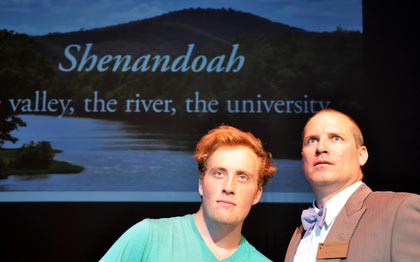The Rev. Justin Allen's pursuit of both the Master of Divinity and Doctor of Ministry degrees at Wesley shaped how he approaches his newest position as the assistant vice president for Student Life at Shenandoah University.
Allen's new position is a promotion that follows logically from his previous roles as dean of spiritual life and director of the Institute for Church Professions.
At Shenandoah, Allen's work focuses on serving the spiritual needs of the student body. "Whether they are Christian, Muslim, Jewish, or Atheist, we're here to serve their needs," he said.
 |
| The Rev. Justin Allen (right). Courtesy Photo: Justin Allen. |
He admits that a truly ecumenical environment is not an easy goal to attain. "We've got students from every faith you can imagine," he said. "Trying to meet those needs when it's not my specific area of expertise can be challenging."
For Allen, the college years are critical to shaping an adult awareness of faith. "If we get them to walk with us early, they won't abandon God," he said.
Allen's most rewarding moments come in helping individual students work through their darkest moments. "I walk with them through their struggles with faith, and I watch them come out on the other side of the dark night of the soul," he said. "To see the dawn with those students is why I do what I do."
"Many of our students never had a faith that's gone beyond the literal," Allen said. "That causes them to struggle. Do they read the text literally or metaphorically or historically?"
Wesley was always Allen's first choice for seminary. "[Associate Dean for Admissions] Chip Aldridge helped me fall in love with Wesley," he said. "He was laid back, introduced me to professors and students and eased any concerns I had. It was the first seminary I looked at where it felt collegial instead of adversarial."
Allen returned for his Doctor of Ministry degree while serving as executive director of the Wesley Foundation at the University of Memphis. He began his doctoral studies with a concentration in campus ministry but later switched to church leadership excellence. "We're training students to be leaders of the church," he said. "It seemed natural to combine the two."
Looking to his students' future and the role they might play Allen stresses the importance of extending the church's reach. "I think the biggest thing we fail to do as a church is get outside our doors," he said. "I'm excited by students who don't just come to Spiritual Life events but are active in athletics and clubs. We all need to be bridge builders from the church to the community."
That need leads him to recommend Wesley to students considering seminary. "It is a well balanced program," he said of Wesley's curriculum. "It has depth in biblical studies, counseling, preaching. It prepares students to be deep theological thinkers and pastoral leaders."
After noting that the school's location in the nation's capital is key to serving both students and the church, he posed a question that shapes much of Wesley's programming. "How can we as religious leaders advocate for our brothers and sisters? How can we answer the call to draw the circle wide?"
Wesley Theological Seminary website
One of seven apportioned giving opportunities of The United Methodist Church, the Ministerial Education Fund is at the heart of preparing people for making disciples of Jesus Christ for the transformation of the world. The 13 United Methodist seminaries help students to discover their calling through the challenging curriculum. The fund enables the church to increase financial support for recruiting and educating ordained and diaconal ministers and to equip annual conferences to meet increased demands. Please encourage your leaders and congregations to support the Ministerial Education Fund apportionment at 100 percent.





